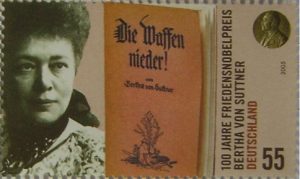Bertha von Suttner (1843–1914) and her novel Die Waffen nieder! (Lay Down Your Arms!) (1889)
“One of the eternal truths is that happiness is created and developed in peace, and one of the eternal rights is the individual’s right to live. The strongest of all instincts, that of self-preservation, is an assertion of this right, affirmed and sanctified by the ancient commandment: Thou shalt not kill”
Bertha von Suttner (1843–1914) became the first woman recipient of the Nobel Peace Prize in 1905. Suttner was dedicated her life to peace and disarmament and used her position as a “writer, journalist, feminist, lecturer, and political activist” to influence people, according to the Oxford International Encyclopedia of Peace (OIEP). In her works, she questioned the nature of war and effectively proved that women were capable of being more than domestic housewives in her pursuit of peace. In 1889, after Suttner’s pacifist novel Die Waffen nieder! (Lay Down Your Arms!) came out, it stirred much controversy. Conservative militarist protested sharply; socialists and liberals supported it all over Europe. Despite this controversy the book became a bestseller.
In June 1843, von Suttner was born as Countess Bertha Kinsky von Wchinitz und Tettau in Prague, which belonged to the Habsburg Empire. Her father was a field marshal who died before her birth and so she was raised by her widowed mother, who had been fifty years junior her dead husband. Suttner’s upbringing was entrenched in aristocratic traditions and her family’s military history made her a staunch supporter of the military in her youth. Suttner was privately tutored in English and French and was groomed to become the wife of an aristocrat. After three failed engagements, however, Suttner became a governess in 1873 and started to write. She met the Austrian writer Baron Arthur von Suttner (1850-1902); they got engaged and married in 1876, despite the disapproval of his parents. The young couple moved to the Russian Caucasus, where they lived with increasing success from their writing for seven years. In 1883, the couple moved back to Austria and, after a reconciliation with his family, lived on the estate of Arthur von Suttner’s parents in Lower Austria.
After their return to Austria, Suttner continued her journalism and concentrated on peace and conflict studies, influenced by the International Arbitration and Peace Association founded by the English pacifist Hodgson Pratt (1924-1907) in 1880. In 1889, Suttner became the shooting star of the international peace movement with the publication of her pacifist novel, Die Waffen nieder! (Lay Down Your Arms!), which made her one of the leading figures of the Austrian peace movement. The book was published in 37 editions and translated into 12 languages before World War I. She used her fame to support the foundation of the Inter-Parliamentary Union, a global inter-parliamentary institution established in 1889 by Frédéric Passy and William Randal Cremer. It was the first permanent forum for political multilateral negotiations. In 1891 she called for the establishment of the Austrian Society of the Friends of Peace (Österreichische Gesellschaft der Friedensfreunde) and became its chairwoman. She also helped to found the German Peace Society (Deutsche Friedensgesellschaft) one year later. Furthermore, she took on the editing of the international pacifist journal Die Waffen nieder! (Lay Down Your Arms!), named after her book, from 1892 to 1899.
After her husband’s death in 1902, Suttner had to sell their estate and moved back to Vienna. She worked as a writer, traveled and gave lectures. 1904 she was invited to address the Third International Congress of Women in Berlin. In 1905 she became the first women awarded the Nobel Peace Prize as a recognition for her life-long fight for peace, but especially her bestselling novel Die Waffen nieder!. The Nobel Prize’s website states that the book’s impact “was consequently so real and the implied indictment of militarism so telling that the impact made on the reading public was tremendous.” During her long life, Suttner continuously were “attending peace meetings and international congresses, helping to establish peace groups, recruiting members, lecturing, corresponding with people all over to promote peace projects.”
Towards the end of her life, when she grew ill in 1913, Suttner spoke at the International Peace Congress at The Hague where she was given the title “generalissimo of the peace movement.” Suttner passed away on June 21, 1914, only a week before the assassination of the Austrian Archduke Francis Ferdinand and his wife in Sarajevo, which triggered World War I.
People often use physical violence to solve their issues without taking into account the very real implications that they have on people and their daily lives. Bertha von Suttner is critical in our history because she makes it very clear that peace is a solution that is both necessary and obtainable. Her work has established different peace organizations around the world that are important to the communities that they work in. In our world, conflict is everywhere and Suttner’s work reminds us that peace is a viable option to take.
Rosie Tran, Political Science and Women’s and Gender Studies, Class of 2020
Sources
Literature and Websites
- Cohen, Laurie R. “Suttner, Bertha von.” In The Oxford International Encyclopedia of Peace, ed. Nigel J. Young. Oxford: Oxford University Press, 2010. http://www.oxfordreference.com/view/10.1093/acref/9780195334685.001.0001/acref-9780195334685-e-692.
- “Bertha von Suttner.” Wikipedia, at: https://en.wikipedia.org/wiki/Bertha_von_Suttner (Accessed 22 April 2018).
- “Bertha von Suttner – Biographical.” Nobel Prize, at: https://www.nobelprize.org/nobel_prizes/peace/laureates/1905/suttner-bio.html (Accessed 22 April 2018).
- “Bertha von Suttner – Facts.” Nobel Prize, at: https://www.nobelprize.org/nobel_prizes/peace/laureates/1905/suttner-facts.html (Accessed 22 April 2018).
- “Bertha von Suttner: First Woman to Receive the Nobel Peace Prize.” Voices Education, at: http://voiceseducation.org/content/bertha-von-suttner-first-woman-receive-nobel-peace-prize (Accessed 22 April 2018).
Images




